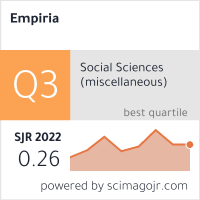The reconstruction of personal networks among immigrants: A longitudinal description
DOI:
https://doi.org/10.5944/empiria.26.2013.7153Keywords:
personal networks, immigrants, adaptation to host society, longitudinal analysisAbstract
Past studies indicated that the personal networks can be a source of social support for immigrants, but it is not a static entity. In this article, we describe a longitudinal study into the change in personal networks of immigrants, performed between 2004-2008 in four groups of immigrants with relatively recent residence in Catalonia, Spain (in total N = 70). The networks were measured twice, both waves post-migratory, with a period of 1,0-3,3 years in between. Comparing the networks of the two waves, we analyzed the turnover in networks, the general tendencies with respect to the changes in composition of the networks, and we investigated differences in these tendencies based on gender, ethnic group and years of residence. The results indicated that networks are relatively unstable, but that nevertheless, the average composition of the networks hardly changes, apart from a small increase in the number of co-ethnics residing in the host society, and a decrease in the number of persons residing in the country of origin. In general, we did not observe a significant tendency toward the incorporation of Spaniards in the networks.
Downloads
Downloads
How to Cite
Issue
Section
License
Los autores que publican en esta revista están de acuerdo con los siguientes términos:a) Los autores conservan los derechos de autor y garantizan a la revista el derecho de ser la primera publicación del trabajo al igual que licenciado bajo una Licencia Internacional Creative Commons CC BY-NC-SA 4.0.
b) Se permite y se anima a los autores a difundir electrónicamente las versiones pre-print (versión antes de ser evaluada) y/o post-print (versión evaluada y aceptada para su publicación) de sus obras antes de su publicación, ya que favorece su circulación y difusión más temprana y con ello un posible aumento en su citación y alcance entre la comunidad académica.










